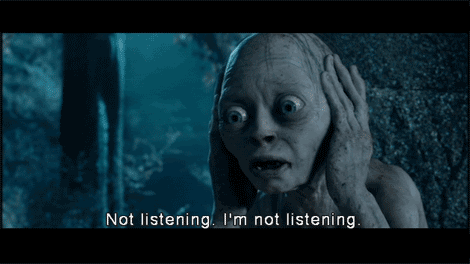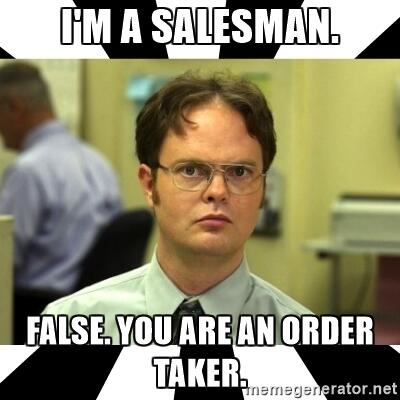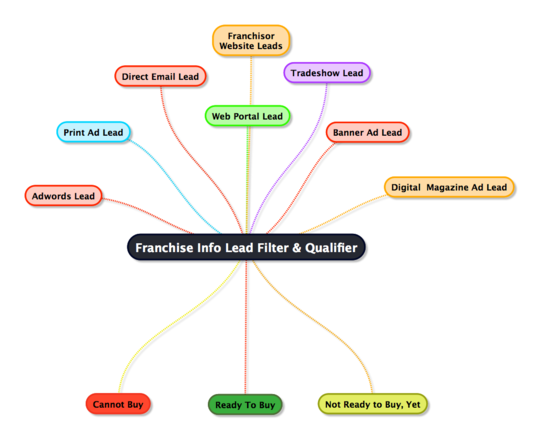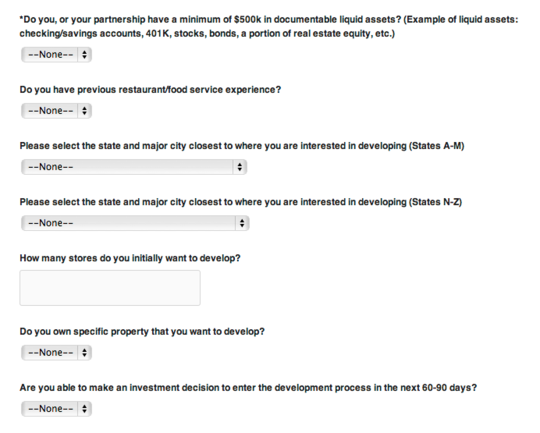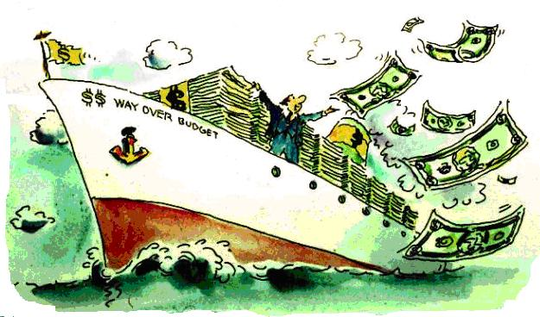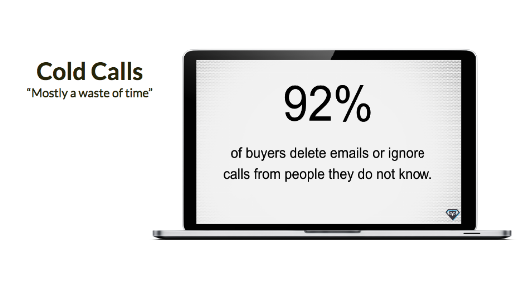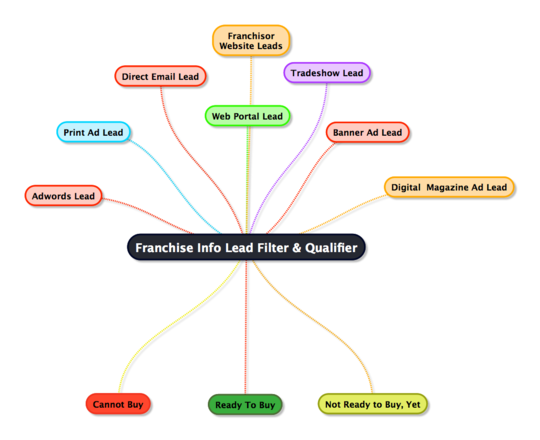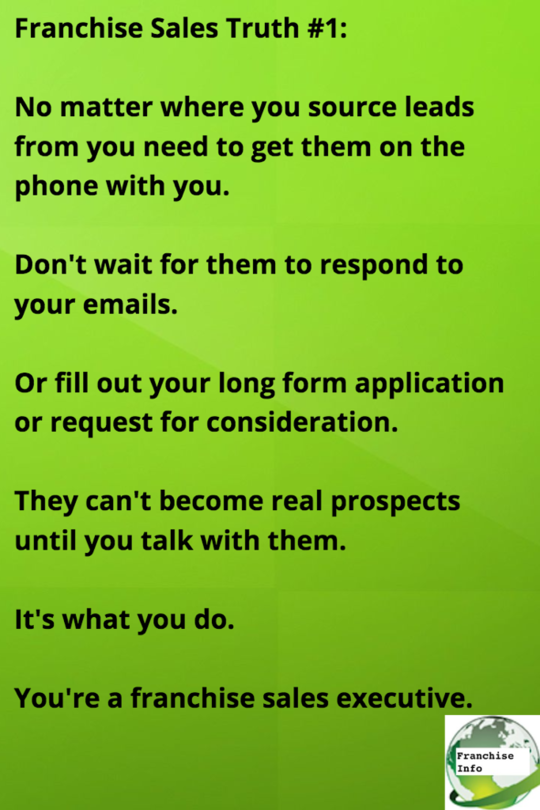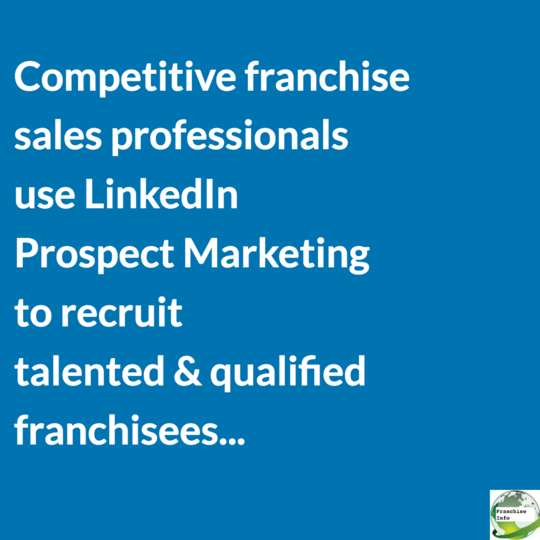A validation video is the story of your Franchise as told by some of your current franchisees.
Choose some of your best, most experienced and diverse owners and film them addressing the same issues and talking points. When edited into a final video, you will have a totally credible presentation of your franchise from the owner's point of view
Be sure to have each of the selected franchisees address the same issues.
When a prospect can hear several owners answer the same question in their own words, there is no doubt about the authenticity and honesty of their comments - it is totally convincing. Plus, you still retain control over the message. You don't want to put words in their mouths, but you do want to avoid inaccuracies or misleading the potential buyer.
Franchisee Conventions are the perfect time to film validations as they are together in one space and a filming room or location can be dedicated to process.
Conventions are ideal because the owners are usually in a very positive frame of mind and you can select the best in your chain - especially if they are receiving recognition awards at the event. Another advantage of filming videos at the convention is the option of using the beautiful venue or resort as a backdrop for filming - after all, going to a great resort for a convention can be a powerful component to sway a prospect's decision.
Another option is using Skype to film and assemble the interviews. Using top notch digital cameras and quality microphones, Skype interviews can achieve excellent picture and sound quality that approaches live filming.
For the 5 Most Fascinating Stories in Franchising, a weekly report, click here & sign up.
Aranco Productions has been producing highly effective validation videos for many years and we would welcome the opportunity to discuss how we can help you produce your own validation video. It just might become the most effective tool in your sales kit.
In a society where poor customer service is rampant, a well-trained company staff can shine if everyone adopts and commits to some simple service approaches.
The result can mean not only keeping your customers happy, but also keeping them period!
What is the biggest and most costly customer service mistake in business today?
My answer is simple - "We're just not friendly enough."
Customers should be treated as welcome guests when they call your office. Instead, they're often treated like an interruption or, even worse, an annoyance. More than 90 percent of all customer service starts with a telephone call. That said, customer service mistakes happen anytime and in many ways.
Customers can communicate with your company through any one of the six touch points of communication and any one of these touch points can damage a relationship, often permanently.
(We left off texting on purpose. Let's leave that out for now. More on that later.)
Two of these communication tools are what is known as "synchronous;" the other four are "asynchronous."
Synchronous is instant communication, when two or more people are able to communicate immediately between each other, i.e., the telephone and in person.
Asynchronous is one-way information, with a lapse of time between initial contact and the response, i.e., email, snail mail, fax and voice mail.
With synchronous communications, you can easily signal your friendliness because you either have facial expressions or a tone of voice with which to befriend a member. With asynchronous, these relationship-building signals are not available, except perhaps for voice mail, when you can hear a smile. Thus, in written communications you must be an obviously friendly communicator. I'll focus on the telephone for now, but these tips and techniques are for all six modes of communication.
Over the years, Telephone Doctor customer service training programs have been presented to many conferences. It doesn't matter where I speak, someone from the audience, a member of the corporation, comes up to me afterwards and asks if I can bring a program to their company.
After a few needs analysis questions it pretty obvious training is needed. Read on.
Personal Note: I was a longtime member of an association and eventually became its president. Several years later, I decided not to renew. When I called to cancel my membership, all I heard was the perfunctory, "Okay, thanks." No one called. No one wrote to ask, "Why?" I figured no one cared - at least that's what I perceived.
Ya know what? It is NOT "okay" for a customer to be unhappy; to leave you without finding out WHY or what happened.
HINT: When someone calls to cancel an order or complain or not renew a membership, it is not "okay." It's often a failure attributable to disinterested treatment, rudeness, or generally poor customer service. I'm not saying the entire staff is bad, rude, or unfriendly, but what I hear most is that the little things - the things that customers expect (and rightfully should get) are missing.
We need to feel a cancellation, non-renewal or a complaint is like a death in the family.
Another common thread is the lack of an organized employee orientation program on customer service and telephone skills.
The usual scenario is: interview, hire, then train using trial by error - or worse, on-the-job training from someone else who may not have had any customer service training.
Let's dust off the Welcome Mat.
Here are some helpful customer service tips to help you start, or benchmark, your own customer service training program.
Bring your staff together at a time when everyone can attend and talk about any frustrating customer events. Discuss how they handled them versus how it could have been done. The meeting can be (and should be) short, maybe 15-20 minutes, and it doesn't need to be daily - but it does need to be done!
Not having a customer service training program in place can cost your company revenue and obviously customers. Also, poor service creates a negative image for the entire organization, no matter how wonderful the programs, products, or publications are that you offer.
Consider taking the serviceskills.com Tour. The 2:20 min Explainer Video.
And if staff has the attitude that no competition exists for the customer to go to, tell them that may be right, but if one customer tells another about a negative experience and so on down the line, you'll probably lose more customers. Then staff jobs will be lost, and eventually, bang - no company.
Take heed, it doesn't matter if the staff is large or small, they still need to be trained.
Here are three of the biggest mistakes in customer service:
MISTAKE 1: NOT SMILING
Solution: Smile! It sounds insanely simplistic, doesn't it? We're taught early on, that a smile can get us a lot. This is true even as adults, especially on the telephone. Since the telephone is the most commonly used mode of communication, your staff needs to understand why a smile works - because you can hear a smile. I recommend keeping a mirror by your desk, so when you pick up the receiver, you remember to smile and you can see yourself smiling.
Sometimes we don't feel like smiling. Smile anyway. The caller doesn't care if you feel like smiling or not. At Telephone Doctor, smiling before you pick up the phone is a condition of employment; not smiling is grounds for termination, and, yes, I have exercised that option. With customer service as our top priority, we simply don't tolerate not smiling before you pick up the phone. Frankly, I'd rather have the caller think your office is closed than to have you answer the phone in a negative mood. (YES, the caller CAN HEAR the smile.)
MISTAKE 2: NOT ACKNOWLEDGING A CALLER'S REQUEST
Solution: Rapid responses - RR. Use what we have called our 'mental stamp.' That means 'this request or piece of information needs an immediate and rapid response.' When we receive an email, fax or note, we immediately send that back to whoever sent it with the words, "Received and will handle." That way the person who asked for the information knows you got the request and everything is moving in the right direction. And it's good communication.
Another very good habit to get into is to ask the caller when they ask for something is: "And when would you be needing this information Mr. Jones?"
Our surveys found that when a caller is asked when he or she would like to receive the needed information, 80 percent of time they did not automatically respond, "I need it now," as you might expect. Thus, you don't have to promise, "I'll get that to you right away." Often, callers won't need something until tomorrow or next week. Asking for a timetable of delivery is good customer service. And remember, "as soon as possible" is not a time. Confirm a date.
MISTAKE 3: IMMEDIATE REJECTION OF A REQUEST
Solution: Be a "double-checker." It's so easy to tell people, "It's too late," or "We ran out of that report" or "we're out of widgets."
Instead, try: "Let me double-check on that for you." It's a wonderful way to defuse any disappointment about you not having what they called for in the first place. This simple statement of double checking immediately defuses some of the tension of not being able to fulfill a request completely. And often when we do double-check, we find a way to get what the person wanted after all.
You now have three techniques (simple as they are) to kick-start your customer service training program.
Remember, the entire staff, from president to maintenance needs to embrace the customer service program or it won't work. Be firm. The company's entire image is at stake since it is unlikely to get a second chance.
Don't have time? Make time. What or who is more important than customers? You'll be surprised at how much fun it is to hear a caller say, "Thanks, you've been super."
For the 5 Most Fascinating Stories in Franchising, a weekly report, click here & sign up.
For a complimentary copy of Nancy's eBook, Hidden Gems of Customer Service, please click here.
Nancy Friedman, president of Telephone Doctor Customer Service Training, St. Louis, MO, is a popular KEYNOTE speaker at franchise, association and corporate conferences.
For a DEMO of Nancy in action, call 314-291-1012 or log on to: www.nancyfriedman.com or email her at [email protected].
Franchise selling is competitive.
And it's getting more competitive as more franchisors come online offering franchises for their concepts. It doesn't matter whether these nascent franchise offerings are investment worthy or not.
What's important they are selling franchises to candidates that you could have recruited for your brand.
So here's what you can do, right now to increase your sales.
You won't need to hire a consultant, buy a new CRM or re-invent your franchise landing pages, etc... although those longer term fixes may be smart to implement as well, but not today.
-
Franchise sales supervisors are the key to your new franchise recruitment success.
In my experience you should give your attention and support to improving sales supervision. Focus your attention on your VPs and Directors of Franchising.
Improved results are more dependent on franchise sales supervisors than on franchise salespeople.
-
Stop your franchise salespeople's habit of simply spewing information at your leads and candidates.
Instead train front-line franchise salespeople to ask the right questions of candidates so they can help qualified franchise-buyers see how your franchise concept fits into their lives or for professional multi-brand & multi-unit franchisees how your brand fits in their brand portfolio.
-
Stop paying lip service to coaching.
Franchise salespeople despite what they may say, want you to help them and manage them. Make coaching part of your franchise sales team's daily routine and give your salespeople the opportunity to bring their candidate sales problems to you for help.
A great sales supervisor who coaches daily can guide salespeople through difficult sales negotiations.
-
Fewer leads mean more sales.
This at first seems counterintuitive but we all know franchise salespeople keep leads and candidates far past their expiration dates.
These expired leads are like soured milk and you need to eliminate them. If you do your salespeople can focus on the candidates that are "raising their hands" and moving forward.
Warning - salespeople won't like this since everyone loves a big pipeline, but they'll thank you later when their commissions are paid.
Now get up from behind your desk right now and start making these fixes happen with your franchise sales team. You'll love the results you'll get. Thanks for listening.
For the 5 Most Fascinating Stories in Franchising, a weekly report, click here & sign up.
I used to believe that franchisees and other business owners failed because they were under-capitalized, but I believe that's a myth.
Someone somewhere many years ago said that the main reason for business failure was under-capitalization and everyone picked up on that and it has continued to this day.
I don't believe it, anymore.
And with US disclosure laws, as well as the opportunity to speak frankly with active franchisees prior to investing in any franchise, there's plenty of opportunity for franchise prospects to learn how much capital they will actually need.
Of course, many franchisees do not do that, and that's generally an indicator that there are other worthwhile things they also won't do.
Here is what I believe to be the major issues.
-
First, many franchisors select the wrong franchisees, and
-
Second, many franchisors are incompetent at training and coaching franchisees.
-
Third, many franchise fees are too low.
All of those problems could be fixed and I'm happy to know franchisors who have addressed those issues and who have enjoyed more success as a result.
Most franchisors appear to be uninterested in matching a franchisee's skills and motivations to the requirements of the franchise business. Why? I don't know.
I guess it's another step in the recruitment process and franchisors don't like delaying that process.
Unfortunately their emphasis is on "sell now" and not "succeed later". I tell every prospect I speak to -- several thousand annually -- to run from a franchisor that does not formally address how their personality/skills/motivations complement the requirements of the franchisee's operation.
Others have mentioned the 35k franchise fee & it's not enough money to pay for the support and training needed.
People tend to think that franchisors use the profit from franchise fees to buy vacation homes, send kids to college, and drive expensive automobiles -- but that's not my experience (and I've worked with many dozens of franchisors in the last 30+ years).
Most franchisors lose money on the 35k franchise fee . . . and then they don't have the money to invest in the proper training and development of the franchisee.
Even smart people need more than a week or two to learn how to operate a franchise business, but franchisors don't see it that way -- takes too long and costs too much.
Unfortunately franchisors have the wrong focus. Making a sale doesn't guarantee making a profit . . .
Only making the right sale and then properly training and developing the franchisee over time will indeed generate long-term profits.
For the 5 Most Fascinating Franchising Stories, a weekly report, click here & sign up.
The quality of franchise sales has decreased over the last twenty years. And I know some of the reasons why & what can be done to reverse the trend.
No Franchise Sales Coaching
First, we have to remember that there is no specialized franchise sales training or coaching available to many franchisors. Everyone agrees that coaching the sales staff is of paramount importance.
In contrast to Amazon, Microsoft, IBM and Xerox, there is no sales as process, no question based selling or no consultative selling training offered to franchisors.
Despite having to sell a complex product with very large price tags, franchise sales is often treated like a consumer sale. "Here is our franchise agreement, one price fits all. Buy my stuff." Doesn't work well.
Technology Doesn't Sell; Franchise Salesmen Sell.
Second, there has also been an unfavorable growth in technologies - first CRMs and now web portals. The aim is to displace the salesman. CRMs and web portals are sold with the promise of making the machine or website eliminate the need for the consultative based sales force.
But, the end product is not a commodity and we cannot reduce the sales process to a mere transaction.
But, Many Franchisors have forgotten How to Sell Franchises.
Finally, many sales departments have forgotten their ability to sell.
Let me tell you about a little test I did, some years ago.
I gathered our top 50 franchisees in terms of gross revenue. I also found their initial applications. I then redacted their names from the applications, but nothing else. (Back then, we weren't collecting a lot of personal information.) I distributed the applications of what would be our top 50 performers to our sales staff.
How many of those top 50 performers would our sales staff identify and process acting only on the very incomplete application?
Zero!
We would have missed all 50 - because we were now more focussed on the demands of the CRM rather than selling. We now demand too much information before we begin the sales process - and most of the information is not needed. What is needed isn't asked for.
We have forgotten how to sell. We aren't mentoring our younger sales forces, the way I was mentored.
So, take a look at your online application. Ask whether you really need the candidate to fill out all the information just in order to start your sales process -- you will find that it is easier to start selling with some information & get the application filled out later on in the sales process. Here is to a better sales process & more sales for you.
To sign up for Franchise-Info's LinkedIn Prospecting Newsletter, click here & sign up.
Since the late 1970s franchising professionals have debated whether or not franchisees are entrepreneurs.
The debate still goes on; some claim franchisees are just employees who buy themselves a job, while others claim franchisees are just entrepreneurs who choose to buy a business instead of building one. Some people base their argument on the literal definition of the term "entrepreneur" while others go further and take into consideration its connotations.
You may say that it all boils down to semantics, so who cares, right? Well, all franchisors should care. This is not a philosophical or academic question; it's a strategic and operational one.
The term "Entrepreneurship" is not restrictive and unyielding; instead it's fluid and flexible. In franchising, we must look at this term not as an absolute, but more as a scale, not as the literal definition, but more as the complex concept it captures. And, the success of your franchisees, as well as their ramp-up and satisfaction, depends on how well you understand what the Entrepreneurship Scale means to your system.
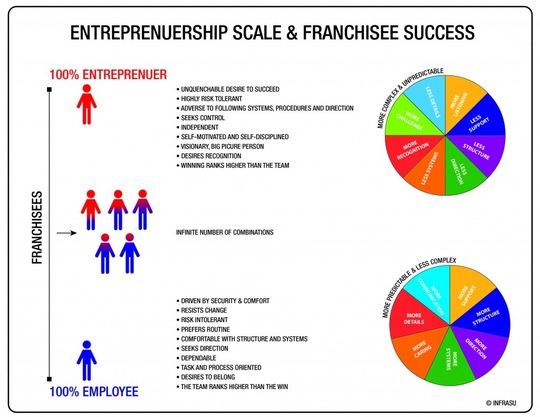
Franchisees, like all people, are complex beings--each one holds a different combination of personality traits, experiences, expertise, learning styles, preferences, strengths, weaknesses, beliefs systems, and habits that make them unique. To hold the perspective that all franchisees are entrepreneurs or that no franchisees are entrepreneurs is equally dangerous.
Both premises are oversimplifications that can take a franchisor in a totally wrong direction. Instead, consider that every franchisee falls on a different position on the Entrepreneurship Scale.
Thus their success greatly depends on how well you define and mold your business model, the franchise sales process, the training and support programs and the tools you incorporate in your business so as to address these differences. If you don't, successful results will remain a game of luck instead of one of skill. It's just that simple!
Although franchise success starts with a valid business model, the success of individual franchisees begins with a clear definition of that model as well as of your culture, and furthermore hinges on your proficiency at granting franchises to those people who better match your company. For example, franchisees who are closer to employees on the Entrepreneurship Scale tend to get better results in a company that has a highly supportive culture and a more structured model with stricter controls, clearer benchmarks, and systems.
On the other hand, those closer to the entrepreneur end of the scale will be more productive in less restrictive systems. So, if tight controls are important to you, a person closer to the ultimate employee will be a better match for your company.
The irony and challenge of franchising is that most franchisors search for individuals whose traits are closer to those held by the ultimate entrepreneur. Let's face it, most of us prefer to deal with people who are self-motivated and totally committed to success. These people move faster through the sales process and are quicker to make a decision. Yet, this type of individual is by nature more independent. Think about it, the people who are more likely to invest in your system are the same people who will be most prone to resist the system in which they invest. On the other hand, those people who tend to be better at following your system are less inclined to choose business ownership, and thus to invest in your franchise offering.
Although the success of individual franchisees starts with a good a match, it doesn't end there. No matter how hard we try or how many tools we use to benchmark and select franchisees, there is simply no way to ensure a perfect match every time. After all, we are dealing with people and the reactions of the most predictable of human beings can't be fully anticipated at all times and under all conditions.
This means that franchisees are always going to be a mix, some closer to our ideal combination and some farther away from it. Therefore the success of every single franchisee ultimately rests on how well you adapt your system, training, communications, and support to each individual so as to empower him or her to follow your system as closely as possible.
The ultimate paradox of franchising is that in order to get the consistency and uniformity inherent in franchising, we must use tailor-made training and support systems.
Franchisees who are closer to the ultimate employee end of the scale will require more support, more caring, more direction, and more coaching and communication in order for them to be able to absorb the information and apply it. On the other hand, franchisees who are closer to the ultimate entrepreneur will need less direction, more listening, less structure, and if you want to keep them from deviating from your system, you have to keep a closer eye on them since they will have a greater tendency to do their own thing which can damage your brand and also cause them to fail.
So, does the debate about whether franchisees are entrepreneurs or employees matter? You bet it does! Success in franchising is crafted, not something that just happens by pounding franchisees to follow the system. Understanding the nature of franchisees and how they learn is a crucial step in designing franchising systems that engender success.
The post Are Franchisees Entrepreneurs or Employees? Why Should You Care? appeared first on InFraSu.
For the 5 Most Fascinating Stories in Franchising, a weekly report, click here & sign up.
"He uses statistics as a drunken man uses lamp-posts... for support rather than illumination." - Andrew Lang (1844-1912)
"According to a recent Gallup poll of 994 Franchise owners - 94% of them felt that there franchise business was successful."
Almost 4 years ago, I did some research on one of the more frustrating franchise statistics repeatedly quoted is average income. Nothing much has changed, so I updated it for today. Especially in light of the claim that 94% of franchise operators 'felt' that there business was successful.
Inevitably, this average income of a franchise owner always suggests that the typical franchisee earns $100,000+ per year.
To cite one example, the USA Franchisee Statistics page on www.franchiseseek.com states that
"In 2008 .... over 30% of franchisees earn over $149,000 per year." I recently read a press release citing a similar figure for 2009.
Such a figure falls into the category: "too good to believe".
In a country where the average income is under $50,000 a year and an unemployment rate in range of 10% to 20% range, this figure just doesn't pass the smell test. If we are in a recession, as I believe we are, is it possible that franchised business operations are a safe haven offering a guaranteed substantial income during difficult economic times? Or any economic times?
FranchiseFacts explored this issue in detail as part of its National Franchisee Survey, 2009-2010.
Our survey asked respondents to report if their business was profitable and, if profitable, their profitability over the most recent calendar year (2009).
Our preliminary findings then were that only 3% of respondents earned more than $100,000 over the past calendar year and only 15% claimed to earn in excess of $50,000 a year.
This is quite a contrast to the $149,000 figure cited above. At the other extreme, 61% of respondents state that their business is not profitable!
To be clear, none of this is suggestive of problems in the franchise industry.
The economy has ended an overheated phase where too many people paid far too much for businesses. They financed their businesses rather than starting slow and building through natural growth. Overly optimistic revenue projections were used to justify high operational expenses. These businesses, and their owners, now are saddled with financial obligations that cannot be paid out of current revenues. Consolidations and closures are inevitable.
For the 5 Most Fascinating Stories in Franchising, a weekly report, click here & sign up.
In interviewing our customers, I found that there were several things they value.
Things they want even before the product or the service.
They boiled down to three basic wants comprising of what we now call the R-T-C factor: Relationship, Trust and Consistency.
Let's go over them:
1. R - - Relationship Building rapport is an overlooked art.
Call many companies and the first word shouted at you is: "Name?" No "nice to meet you by phone" or even a "good morning."
There's very little rapport building found in today's customer service. Relationship starts within the first 4 to 6 seconds of a phone call or within 30 seconds for an in-person visit. That sets the stage for the rest of the transaction.
Plus, it lays the groundwork for possible future business. Rapport building and relationships are vital to every communication exchange. It's a simple basic process.
2. T - - Trust If the customer is unable to trust what you say, the relationship will melt to zero.
Gaining the trust of your customer is the KEY to relationship. From following through when you promise to call or fulfilling the company's guarantee statement, creating trust is vital.
If those trusts are broken, it's a big fence to mend. Keep your word to gain the trust of your customer. They need to know they can count on you. Before any sale, a customer must buy "you."
3. C - - Consistency The McDonald's hamburger in Cancun, Mexico tastes the same as the one in Des Moines, Iowa. Why? Consistency. The taste will be the same in each of the stores.
A business should run with the same consistency. It shouldn't matter who the customer talks with. Personally, I'm skeptical when someone tells me to, "Be sure to talk to Joe. He's the best there is." I'd rather hear, "You can talk to anyone in our office."
In summary, the R - T- C Factor is what customers look for and deserve in any of their transactions. So, I ask you? Do you provide enough R-T-C to keep your customers satisfied? As we like to say, this is not rocket science, it's not major surgery. . . it's plain old common sense. Do it.
A recent IFA Annual Conference speaker, Nancy speaks at franchise meetings across the country.
Her passion for the small business is second only to her techniques on sales and customer service.
Her reviews at IFA were off the chart. Contact Nancy personally about your meetings.
314 291 1012 [email protected] or www.nancyfriedman.com
For a complimentary copy of Nancy's eBook, Hidden Gems of Customer Service, please click here.
This is a very simple question.
It was recently asked in a LinkedIn Franchise Group.
And I bet we all want to know the answer.
It would make it easy to build next years franchise marketing budget for franchise buyers if we just had a short-list.
Even better if it had a performance ranking.
There were almost 50 answers and comments to this important question.
Here's a selection of what franchising people said -
"I speak with franchise development departments every day and have found that they can fork out as much as 60% of the initial franchise fee in order to secure qualified franchisees (using franchise consultants, recruiters, etc.). Are there any databases of open territories for potential franchisees to search? Vice-versa are there any databases of franchisees in the market to open a new location?" Mike Mackin
"It has been my experience that you can "catch the bigger fish" through today's portals. The secret is working with your portal vendor and let them help you on the franchise investment levels that you post on the site. The best experience I have had has been with Franchising.com. There numbers are a little lower, but the quality is very good. And don't forget that most consumers are not going to tell you what they really have in the bank until you get further down the sales process." Phil Mettra
"Portals are just another outlet for reaching your target, I don't think you can narrow down a specific vendor that does better than another. If the opportunity on the portal is attractive enough, the portal also ranks highly on Google for top keywords and it has healthy traffic stats (which the portal vendor can provide to you) then you have a winning vendor. You should always do your due diligence and ask those vendors to provide you monthly traffic to the page you will be listed and can even go as far as asking for the top 3 IP locations to ensure they are based in your market. Remember that candidates can come from anywhere but your digital presence, especially social and reputation, is what will give you the edge in higher investment brackets." Brendon Major
"My experience with the portals is that they sometimes work beautifully and other times they just dont. The exact same advert on one site delivers 10 leads and on another none. To be honest although I have met many "experts" I have never found one that has been able to unravel the mysteries of the portals." Sean Goldsmith
"Just wondering if there are other portals more likely to reach and succeed with the higher investment prospects? I believe in a strategy of creating presence and buzz for your brand, with a wide digital presence probably now being the top tactical priority" Kevin Kruse
"I may have a bit of a different take. If a company is looking for "high dollar" candidates, I suggest the you will find them better using highly target public/media relations campaigns, instead of portals. As noted above, using portals to find YOUR candidate is a bit like fishing in the Atlantic Ocean with a single line, a bobber, a safety pin, and a piece of corn as bait. They simply are not designed to find a specific type of candidate. They have tens of thousands of names/inquiries, but they simply cannot be targeted to YOUR candidate. It is MUCH better to design a PR/MR program that targets YOUR candidate BEFORE the person even starts looking for a franchise. By the time a potential candidate hits a portal, you are already competing with hundreds of other franchise companies. Right? Portals have a role, but not for finding a specific type of candidate." Dr. Michael (Mick) Riddiough
"Before you start your campaigns, it is good if the portal can offer statistics for the locations where you are listing in, because different categories work in different locations. The categories can change every 3 months, so it is important to keep on top of the statistics and results. Another point which might help, is that franchisees don't always come from franchise portals, our web portal is a business and franchise for sale portal, mainly because some people are looking for any business opportunity and inquire about the franchise opportunities on the website. It is a larger net to catch enquirers. I hope this is helpful in understanding web portals and how to run a more successful franchise recruitment campaign." Paul O'Brien
"That is great advice, and I like your approach to testing adverts and then placing the most highly effective ones. The big stumbling block is how forthcoming the portals are with their stats. I know in the UK you would have an easier time asking the Pope for his hand in marriage. Are the US portals more forthcoming?" Sean Goldsmith
"I have sold several franchises for clients with an investment level of $400k-$800k by using portals.Granted, there will ALWAYS be the prospect that overstates the amount of capital they have available and you have to just move on and keep on dialing. There hasn't been one portal that seemed to bring in more qualified leads on a more consistent basis than another. I do seem to spend a lot of time chasing credits for pay per lead sites that claim they "verified" leads before sending them, but by and large every portal site seems to do a fairly decent job for me." Tom Parks
"The biggest issue which all Franchisors are facing about this approach is the cost. Some websites in Australia are offering packages which help Franchisors to do this at a more cost effective price. Keep an eye out for this. Otherwise the only other advice I can offer on this is to keep track of leads and quality of leads which are being generated by the website. One of our clients mentioned to me once, from 1 website they had received heaps of leads, but didn't generate any solid leads, while from another they received only a hand full of leads in the month, but 2 of the lead had converted to solid leads" Paul O'Brien
"How helpful are portals in generating qualified leads? My experience tells me that really depends upon your brands investment range. Generally speaking the top 5 portals basically cost the same amount to advertise on them. However because of my sector "automotive" vs "food" the portal is unable to generate me enough leads to make the potal investment worthwhile. I understand the ratio on portal leads to be 200:1 or even 250:1. It would take years for a portal to drive me that much traffic. At which point I would have spent far more than the inital franchise fee in marketing dollars." Lee Oppenheim
"Portals definitely "had their day", i.e. in the late 1980's through the early 1990's. They were THE way to market one's franchise. Today, however, they have become quite common place in our industry, and while there definitely are differences among the wide range of portals, overall, the range of inquiries to sales, as Lee mentions, is in the 200 - 250 to 1. In some ways, portals have become today's franchise "classified ad" section of the Internet. And, it gets very expensive to hire high quality sales people to field these return phone calls. As Franchise Update points out in its 2013 annual marketing survey, the total advertising placement cost associated with one sale these days(for their surveyed companies) was around $13,000...not including personnel costs. Is it the same today?" Dr. Michael (Mick) Riddiough
"Something to be careful with which you might not know about. Make sure that the website which you are using doesn't use a technique called lead thinning. This is when the website generates 1 lead and farms it off to multiple franchisors on their website. Usually the person making the enquiry doesn't know that this is happening either. The way to identify this is when you start calling a lead, the person will say something like "I didn't inquire about your franchise or business". This makes the website look good because of the number of leads generated, but the quality of leads is decreases dramatically." Paul O'Brien
"Terrific dialogue everyone....... portals? To use or not to use...... I heard a lot of "casting a wide net" as well as "be specific in your targeting, e.g. Veterans" , which leads me to a conclusion I've reached before: we are in a challenging, competitive environment for sourcing qualified leads which turn into franchisees. At least we have a forum for discussing our strategies and tactics. Thanks for the insights....." Kevin Kruse
"The specific answer to Kevin's specific question is "No"...at least not by design and not very productively...and it is likely to be quite expensive for the franchisor. I once had a franchisor client in which the "all in" cost was $1.4MM. We did quite well with it. Did we use portals? Yes, as one avenue, and it was truly "dialing for dollars". We did much better with highly focused PR/media relations in terms of finding "high value" candidates." Dr. Michael (Mick) Riddiough
"I disagree. Portals work. You already used portals for your client, even in light of the reality that it's 'dialing for dollars.' Hey, it still takes 35 tons of ore to smelt one ounce of gold--all you have to do is make 200 enthusiastic dials. Big deal. Get with the idea that selling takes concerted effort, and plenty of money. If the average cost of sale (not including commissions) is around $12,000 or so, the obvious path is easy: pick 3-4 top portals;" Paul Stewart
"Your approach works for you, and that's great. I take a different route, and that works for me and my clients. I don't think one is right and one is wrong, just different...in many ways. I prefer more targeted and efficient ways of finding the right candidates. "Dialing for dollars" is simply not my preferred way" Dr. Michael (Mick) Riddiough
"Yes, absolutely, portals work for generating some quality leads that result in Franchise sales for the Franchisor at the investment levels stated" Ronald Silberstein CPA and CFE
"Portals are only as effective as the sales team that are working them, and the matrix you use to measure. Keep in mind the higher the investemnt the fewer the leads you can expect so it is important that your team devote the necessary effort into follow up with each and every lead that comes through." John Byron
"I would say the portals are only as good as the marketing team who works them and and the adverts. If the proper research hasn't been performed before the advert goes up, there is no guarantee of success" Paul O'Brien
"Simple answer to a simple question.. The answer is yes, you have to be in portals. You can add filters to any portal to try to catch the investor you are looking for. Portals are one leg of a triad that you need to build to reach your target customer." Dale Waite
I am glad we solved the riddle of getting high net worth franchise web portal inquiries.
Franchise inquiries from web portals are minimal expressions of interest.
They are not leads.
You can't designate an Expression of Interest a Franchise Lead until you've qualified them.
The most reliable way to qualify them is to talk with them.
Franchise-Info has some ideas for you to work on this problem.
If you call me we can discuss two things -
- What to do with all your inactive inquiries who have expressed an interest
- How to attract Franchise Buyers online
I am easy to reach at 443.502.2636 and [email protected]. I answer my own telephone. And I call people back.
For the 5 Most Fascinating Stories in Franchising, a weekly report, click here & sign up.
Apple products are immensely popular with people.
And with me too.
You can't help but admire what Steve Jobs did with Apple the first time he built it.
Even better the second time when he was brought back and he re-invented it.
The products are great and easy for people to use.
I've had an iPhone for quite awhile and I moved to a MacBook Air in June 2013.
It's the best computer I have ever had.
- Super easy to use
- Very fast
- Great design
- Long battery life
- Weighs just less than 3 lbs
- Terrific telephone support
There's a lot of fun and useful things about the MacBook Air.
In June this year I had a problem with my MacBook.
The left speaker crackled intermittently. Which is not something you expect from an Apple product.
So I called AppleCare for help and they are almost always very good over the phone. The Apple tech agent walked me through the computer to do a reset and a computer share which didn't resolve the speaker problem.
AppleCare made an Apple Store appointment for me for the next day.
At the Apple Store it's an onslaught of hip Apple employees all dressed in official Apple tee-shirts with a super cool and relaxed demeanor.
After you get handed off to 3 very nicely trained people who can't help you then wait for the on-site tech who can.
Anyone who has been to the Apple Store knows it's loud. The decibel level has to be very high.
So I have a crackling speaker problem on a MacBook Air and the technician needs to hear it. Very lucky for me he does and they don't think I am imagining the problem.
That was good news.
The bad news was that they needed my MacBook for 3 days once the replacement speakers came in to the store. This meant I needed schlep back up to the Apple Store which is a 62 miles roundtrip and about one and 45 minutes of driving time if you catch a traffic break on I95. So my one trip to get my MacBook speakers up to speed would take 3 separate trips.
It was under warranty and Apple techs confirmed that there was a speaker crackling problem.
I followed the Apple servicing process and they fixed my MacBook Air's speakers. We tested it at the Apple Store and everything was as it should be.
Or so we thought.
Mid-September the same thing happens all over again. Speaker crackling and I call Apple Support. We run through their diagnostic process and reset. That fails. We schedule a visit to the Genius's at the Apple Store and I schlep up their once again. Where the Apple Genius wants to replace the speakers again and go through the MacBook to see if there is another problem.
They order new parts. And I go through the 3 trip drop off and retrieve Apple Process once again.
Not 4 weeks later speaker is crackling again.
I do the Apple Care telephone support and Genius Bar scheduling dance where I asked that a manager meet with me. I get to the Apple Store and go through the phalanx of Apple Tee-shirted people who can't help me and after waiting I meet with Helen the manager.
I explained to Helen that this now the 3rd time for my MacBook Air's speakers to fail. And I said that as good as the Apple Geniuses are they can't get my MacBook right and that it was a waste of my time to keep trudging back and forth to the Apple Store. Was it time for Helen to replace my MacBook Air with a new machine that fully functioned?
Helen convinces me to let her send the MacBook out to Apple's service center for better diagnostics and to a place that would have any part my computer would need. I agreed to it.
5 days go by and I receive my notification that the repairs were done.
This time Apple replaced the speakers (the 3rd time) and in addition a new Logic Board.
It didn't take but a few days and the speakers started to crackle again.
So I make the appointment and go to the store. I ask for Helen and I get Eileen. I tell Eileen the speaker story and she gets a Genius.
Let me take a break and tell you some of my observations of the Apple Store and the Apple Way. When things are easy to fix or user error the Apple Way works. And if you're buying something they have that down to perfection.
Apple team members have no last names and you can't tell a manager from a janitor since they all wear the very same hip Apple Tee-shirt. My thinking is you should not trust a company whose employees have no names. Apple has a reason for this and it's not to help you.
The Apple Way is designed to control you.
The hand off from employee to employee and queueing to wait for the Genius or manager.
The assault on your hearing with the noise levels and super bright lights.
The presence of uniformed and armed police.
The Stepford Wives trained all too nice staff.
Eileen and the Genius can't get the speaker to crackle and hear the noise. I suggest to Eileen that it is time to replace the MacBook. She wants the Genius tech to look it over.
The Genius complete's his inspection and another hip Apple employee tells me my options. Well there was only one option. Get a 4th set of speakers. To which I object ( the Apple hipsters do not like objections) and am told that maybe there really isn't a speaker problem.
Now I have been more than reasonable about a product that I love. But my Apple hipster has gone too far and I step it up a notch and she does not like it. She feigns a righteous indignation and runs off to get Eileen since she refuses to deal with me any longer if I am going to be difficult.
Eileen and I recap my MacBook speaker adventure and she now thinks it's a good idea to replace my MacBook right then and there. So back to the Genius Bar to set up the new MacBook and move my data.
So I won. I beat Apple. Just barely.
They were never going to offer a replacement Macbook. And they will make you earn it. The Apple Way is designed to suit Apple it's not about you.
After over 30 hours of my time and having driven 700 miles on this problem I am back to where I started with the exact same computer I originally bought.
If you haven't tried a MacBook Air I recommend it.
There is a huge difference between a problem and an inconvenience. You know it, I know it and your customers know it.
Listen to what happened to me the other day. We ordered a new copy machine at Telephone Doctor.
Gentleman brings the machine into the office. As he's installing the machine, one of the ladies sees the screen has a rather large crack on it and tells the installer. The young man who wheeled in the machine came looking for me to tell me and proudly exclaims, "Mrs. Friedman, we have a problem."
Because I am a problem solver I asked, "What is it?"
"Well," he says, "the screen on the copier machine is cracked."
I say, "Can it be fixed?" He says, "yes ma'am."
"Well, then," I tell him, "we don't have a problem, we have a minor inconvenience." He thought about that and then smiled.
"When can it be fixed?" I ask. "Oh, today for sure," he says.
Then I assured him, "We don't even have an inconvenience."
Why even use the word 'problem?' Why alert the customer to that? If you really need to let them know something isn't right. Use the word "inconvenience" and then to really simplify it, slice it into 'minor inconvenience' or 'major inconvenience.'
Customers are able to handle 'inconveniences.' Minor or major. They do not like problems. So avoid that word.
When you have a major inconvenience, be sure you have a major answer.
Remember Sales 101: When you're part of the problem, you need to be part of the solution.
Replace the word 'problem' with 'inconvenience.' Watch what happens - the entire situation goes down much better.
# # #
Nancy Friedman is a featured keynote customer service speaker covering communications skills and showing you how to capture & navigate the call.
Want Nancy to speak at your meeting? Call for a speaking demo & full information packet of Nancy - 314.291.1012, visit www.nancyfriedman.com or email [email protected].
Nancy is president of Telephone Doctor Customer Service Training and has appeared on OPRAH, Today Show, CNN, FOX News, Good Morning America, CBS This Morning and hundreds of other radio and TV shows.
The author of eight books on sales and customer service, Nancy is the spokesperson in the popular Telephone Doctor customer service training programs.
For a complimentary copy of Nancy's eBook, Hidden Gems of Customer Service, please click here.
For the 5 Most Fascinating Stories in Franchising, a weekly report, click here & sign up.
My entire career has been focused on developing ways to help companies communicate better with their customers.
Great customer service is sought by most everyone. Businesses go out of their way to give good customer service. Some make it; some don't.
Customers go out of their way looking for companies that give great customer service. Some find it; some don't.
We have tried so very hard to explain to both sides - the customer and the business, it's not rocket science; it's not brain surgery. It's plain old common sense. But you and I know common sense is not out there.
People love to vent. One of our books, Customer Service Nightmares, is proof of that. They love to report on how badly they've been handled.
I cannot count the number of articles out there on customer service. Some are good, some not; some have new ideas; some speak the old tried and true. And that's where Telephone Doctor customer service training comes into play; plain old customer service.
We call it 'Back to Basics.' You can imagine we have hundreds, if not thousands of ideas, tips, skills and techniques to share. Today we bring you 15; fifteen customer service tips that are good old common sense thoughts.
Short, sweet and to the point. Enjoy.
In no important order. They all should be #1.
- "Please" and "thank you" always have been, and always will be, powerful words. Seldom overused.
- "You're welcome" is the best replacement for "no problem."
- "Sorry 'bout that" is not an apology. It's a cliché. "My apologies" is much better.
- A frown is a smile upside down. Stand on your head if you must; but SMILE, darn it!
- You cannot do two things well at once. Pay attention to the call or the customer.
- One word answers on email or in person are considered cold and rude. Three words make a sentence.
- Learn what phrases frustrate your customers. They're probably the same ones that bother you.
- When was the last time you sent flowers to someone just because?
- Drop a personal handwritten note to a client and just say "thanks for being a good client."
- "Hey, how 'ya doing?" is not a great way to start up a conversation. It's not any way to start up a conversation. Period.
- Out with friends or family? Put the cell phone away. Talk for 30 minutes. (If you remember how.)
- Email manners? The same as phone and in person.
- The old "don't tell 'em what you can't do; tell 'em what you can do" applies to most, if not all, customer interactions.
- Get excited! Make sure you say something fun, nice and appropriate.
- Oh, and smile. That needed to be said twice. A phony smile is better than a real frown.
If you start with these tips, skills, ideas and techniques, you'll notice a big difference in how your customers respond.
Yes, there are many more; didn't want to overdose on this. More coming during the year. Thanks.
###
Nancy Friedman is a keynote speaker on customer service at franchise, corporate, and association meetings. The author of 8 books, Nancy's articles have appeared in Wall Street Journal, USA Today and other major dailies. President of Telephone Doctor Customer Service Training, she can be reached at 314 291 1012 or www.nancyfriedman.com.
These days it's extra challenging to satisfy and keep customers. It's even more important than ever because customer loyalty is generally considered the primary engine today to retain sales levels and gain an advantage over the competition.
It's been this way for a long time; it's just getting more attention now. We just need to do things better.
There are hundreds of ways to do better.
Here are 9 we like:
1. Know your product and services . . . inside and out.
Not being knowledgeable frustrates customers. An uneducated employee is semi-useless to a customer. Job knowledge is key in any position. If for any reason your company doesn't offer job knowledge training, make it your own priority to find out as much as you can. Job knowledge is a key ingredient to serving customers.
2. Believe in your product and services 150%.
We know of a salesperson who has never had any formal sales training. However, based on the belief in the product, services and contagious enthusiasm, this person is a top seller. People LOVE to buy from people who get excited about their product. Customer service reps are salespeople!!!
3. Walk the walk, talk the talk. Practice what you preach.
A Ford dealer would not drive a GM car. Employees need to support their company's product or services before they can expect their customers to have confidence in them.
4. Keep your word.
Companies spend thousands, sometimes millions of dollars advertising their services and products. They tell the customer they are THE BEST, THE ONLY, they are NUMBER ONE. "WE GUARANTEE OUR WORK" isn't enough. Customers need to know that you'll do what you and your advertising says you will. If you claim to provide the 'best of anything,' make sure you keep your word. And be sure all employees keep their word. Telling a customer something will be to them in 7 working days, and then having it NOT show up is a credibility buster.
5. Return all calls and emails.
It boggles my mind when a call or an email is not returned. There's not an excuse in the world I could buy when that happens. Sure, some of us get way too many calls and aren't able to return them in a timely manner. Well, then have the call returned on your behalf! Not returning an email? How much work does that take? DUH?
6. Don't ever forget "who brought you to the dance."
In other words, there are always customers who were with you from the start. They helped make your business a success. They believed in you. A nice simple note once in a while is an ego booster to them and you'll feel good about it too.
7. Make NO ULTERIOR MOTIVE CALLS or NOTES.
Every once in a while, drop a note or make a phone call to customers (and prospective customers) without trying to 'sell' them something. Telephone Doctor labels those "no ulterior motive" calls. They're "just because" calls. . . and very welcomed. When was the last time you heard from a salesperson or a company just to say HI? (See what I mean?)
8. Be in a good mood.
All the time! Be the person that when the customer leaves or hangs up the phone, they think to themselves, "That was a great call/visit." Not in a good mood? Learn how to be. Remember one of our Telephone Doctor mottos: "A phony smile is better than a real frown." Do you really think the first runner up of the Ms. America contest is as "thrilled for the winner" as she says or shows she is? Talk about a great big phony smile!
9. Participate in customer service training programs at your company.
Sure you know how to be a good CSR. But everyone could use a refresher. And if there are no programs in place on customer service, ask for them. At best, you'll be ahead of the competition, and at worst, you'll at least be even with them. Customer service is not a department. It is a philosophy. And it's for the entire company. Everyone needs to embrace it - or it doesn't work.
# # #
Nancy Friedman, president and founder of Telephone Doctor Customer Service Training, St. Louis MO, is a speaker at association, franchise and corporate meetings. She can be reached in St. Louis at 314 291 1012. Or visit www.nancyfriedman.com.
I love to read short blogs sometimes and I love to write them too. Blogs don't always need to be long. This is one of those short ones. It's about strangers and customers.
We know we have paid customers.
We know we have internal customers.
We know we have potential future customers.
We even know we have lost customers.
But what about strangers as customers?
What do you mean, Nancy?
I mean, are strangers your customers?
Let me explain. We sit next to strangers on an airplane, in movie theaters, buses, trains, restaurants, all sorts of places. We interact with them. Often in depth. Some tell us their life story before we even get a name and sometimes we never do get a name. We often tell strangers our darkest secrets. Therapeutic that it is; strange isn't it?
We shop next to strangers, we talk to all sorts of strangers. Even though we were warned as a child NEVER TALK TO STRANGERS. Ever!
We say "excuse me" to strangers when we bump into them at the mall. We say "thank you" to a stranger who might help us carry a package or pick up something we dropped or hold a door for us. When a stranger says "thank you" to us, we invariably tell them "you're welcome."
There is even a great old movie called Strangers on a Train. Remember it? It is about two strangers who meet up on a train and decide they should kill each other's spouses. (I'm not saying it's a good idea; simply revealing the plot.)
Often times at Christmas there are folks running around giving money to strangers; people they don't know and will probably never see or talk with again. We donate money to strangers all the time. We tip strangers at restaurants. Sure, they do a job for us. But nevertheless they are still strangers.
So I ask you, are you nicer to strangers than you are your customers? Or are you strangers your customers?
# # #
To download our Ebook, Hidden Gems, click here
For a demo of Nancy in action, and full keynote speaking packet, call 314.291.1012 or visitwww.nancyfriedman.com.
Or email [email protected] See how quickly she replies
Nancy Friedman, president of Telephone Doctor Customer Service Training, is a featured keynote speaker and subject matter expert on customer service, engagement opportunities and communications skills at franchise, association and corporate meetings.
Nancy has appeared on OPRAH, Today Show, CNN, FOX News, Good Morning America, CBS This Morning and hundreds of other radio and TV shows. She has been published in Wall Street Journal with her column, "Don't Strike Out with Your Customers."
The author of eight books on sales, communications skills and customer service, Nancy is a subject matter expert on these topics. She is the spokesperson in the popular Telephone Doctor customer service training programs.
As most of you are aware, all the stories we share with you at our onsite programs and in our newsletters, blogs, etc., are 'true.' Nothing is made up. They either happened to me personally, I witnessed them, or I verified the information if I am going to share it. Credibility is key to Telephone Doctor.
We don't make anything up. That being said, I want to share a story that happened to me the other weekend.
It's a clear example of WHY we don't need to agree with the customer all the time.
I went into my bank prepared to make some minor changes to a few accounts. It was a Saturday and the only other folks in the bank were the teller and the one lady (who never gave me her name and had no badge) who tried to help me.
I say 'tried' because it was a comedy of errors. Now, please know, just because I'm the Telephone Doctor I do not make a big deal out of poor service. I don't try and teach the person what to do on the spot when I don't agree. If they've done something not customer friendly I usually spank them with my wallet and go elsewhere. Very few people appreciate on the spot training. So I just take notes.
Anyway, after many faux pas in her service I get up to leave. I turned around to her and said (with a smile), "Oh, by the way, you're online banking stinks. It's not very user friendly."
Drum roll please.
Without missing a beat she says to me, "Oh yes, we hear that a lot." (Almost as though she was proud of it.)
All I could muster up was a blank stare. I released my shock and said, "OK, have a nice day." I got the same back.
While I didn't tell her what to say, I will tell you, our readers.
- She never introduced herself. (I should have asked, but I waited to see if she would.)
- She didn't ask for my name; just my account number.
- She rarely smiled.
- At the end when I asked, "I wonder, could I have done this over the phone?" She nicely said, "Sure you could have." (Why didn't she tell me that first?)
So again, I didn't try and 'fix' her on these points. But when I told her how bad the online banking was and have her tell me, "Yes, we hear that a lot." That floored me.
Where was: "Oh my goodness, tell me what happened."
Where was a pen and paper to jot my notes down as I told her my concerns about their online banking so she might share with whatever department to fix it?
Where was some sympathy? Had she ever had the same problems?
Why didn't she let me know, if this ever happens again, we can make it easier for you on the phone. You wouldn't need to make a special trip.
Where was her training?
Sorry folks, this is basic Customer Service 101.
Let's hear your own stories.
The 'BEST,' or shall we say, the worst will win a set of three (3) Telephone Doctor books.
Reminder: Listen to the customer. They aren't always looking for you to agree with them; sometimes they just need you to help them; to hear them; to see them; to listen to them.
Nancy Friedman , president of Telephone Doctor Customer Service Training, is a featured keynote speaker, and subject matter expert on customer service and communications skills, at franchise, association and corporate meetings. She has appeared on OPRAH, Today Show, CNN, FOX News, Good Morning America, CBS This Morning and hundreds of other radio and TV shows. She has been published in Wall Street Journal with her column, "Don't Strike Out with Your Customers. Nancy is the author of eight books on sales, communications skills and customer service. She is the spokesperson in the popular Telephone Doctor customer service training programs.
For a demo and full keynote speaking packet of Nancy call 314.291.1012 or visit www.nancyfriedman.com.
To download our Ebook, click here
Love to get your feedback. [email protected]
Changing things for the better requires an element of risk.
After a large reorganization of a major QSR franchisor I worked for, I ended up with greater responsibility and not enough resources.
We had a set way of doing things - lots of procedures & steps. And that was fine when we had more people. But not now.
I also had a new boss.
He wasn't actually new to me. Reporting to him was new.
(My old boss took an "early retirement" as part of the reorganization.)
I had been with the QSR just over two years.
The new responsibilities were a bit of a shock. However, I did have some new ideas on how to make things work and sell some more franchises.
So I got to work.

One of my first ideas was to change how we processed incoming leads. Very basic but important stuff on how we answered the phone. Yes, leads in the early 1990s came in mostly by telephone & we screened and qualified inquiries.
My small team of three developed a plan. I wrote the plan up and then scheduled time with my boss to see what he thought. It wasn't a major change and so he approved it.
The second thing I wanted to do was to change some of our lead generation plans. I wasn't changing the budget but I was rebalancing the allocations. I went to my boss presented the plan and got it approved, too.
Now I had great boss. He was open to new ways of doing things and wanted the new franchise development to be successful.
I had a big job to do and more improvements planned.
But, when I brought to my boss my third idea for his blessing he stopped me dead in my tracks and asked me a question?
"When are you going to take some risks and stop asking for permission on everything you think is best to do?"
He didn't need to spend more time listening to my explanations.
He told me he would know if it was a good idea down the road when the franchise results for the year were accounted for.
So I took some risks, without asking for permission first. Made a lot of sales that way. Sales to some great franchise operators!
A recent email we received below gave us some good ammunition for this blog.
While the industry, as you can see, is in the legal profession, believe me, it can happen in every industry.
It's from an attorney, and Mike Webster tells me that this is par for the course.
1. Around 1:00 p.m. today I returned opposing counsel's telephone call from this morning.
2. The first person that answered the phone took my name and asked me to hold while he checked to see if she was back from lunch.
3. After a short hold, he came back on the line and transferred my call.
4. Now, at this point opposing counsel's assistant answered the phone.
5. She had to take my name for the second time and then put me back on hold.
6. After holding a couple of minutes, opposing counsel's assistant came back on the line and asked if I could call back in twenty minutes!
7. I am sure that her assistant told opposing counsel that I am a jerk because I answered, "No, I am calling her back now."
How many .1 of an hour were billed for this non-communication do you think?
Ordering via tablets is making its way into restaurants and the quick serve industry, and it has proven successful.
Panera is one that a tablet was recently spotted - after watching customers, it seemed that customers were receptive to the concept and turned to the tablet to place orders versus waiting in line.
The system allows customers to place their order without waiting in line. After their meal, the receipt is sent to the customer via email, and a quick feedback survey consisting of three questions is included. This is a great example of how Panera is making the most of the tablet technology.
In sit down restaurants, the increased sales and tips are being realized.
According to a
recent study, the use of tablet ordering cuts the meal time by seven minutes - not only is this more efficient for guests, but it also allows for tables to be turned over more quickly.
For servers, that is good news: more tables can result in higher tips.
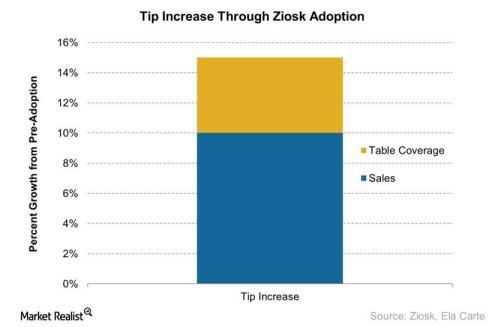
To add to the increased efficiency and resulting guest satisfaction, tablet based ordering can take things to the next level with restaurant guests, if tablet based consoles are used to their maximum potential.
For example, the
Customer Engagement Console allows for a robust program that can incorporate customer feedback, encouragement to sign up for loyalty programs, and a gateway for guests to join the restaurant on social media while they're still at their table.
Throw in a feedback survey and restaurants have a quick, efficient way to truly engage with the customer on various levels while ensuring customer satisfaction and loyalty.
Technology is making improvements for the restaurant industry. While retailers may be a bit slower to adapt to the tablets in their locations, I anticipate that this will increase significantly in 2014.
If you want to know more about how a modern customer loyalty program would work for you, drop me a line on LinkedIn.
For the 5 Most Fascinating Stories in Franchising, a weekly report, click here & sign up.
Everyone's busy, stressed out and short of time.
Are we forgetting some people?
We usually remember to thank our customers.
And we probably don't have any trouble thanking family.
However, there is a group of folks that are often left out of the "thank you" pile.
And that would be our co-workers.
Known as our INTERNAL customers.
The folks we spend most of the day with side-by-side. The folks that are thought of as our 'home away from home' family.
Sure, we argue and disagree with co-workers just like our family. And that's OK, because most of us have a family environment in our office. We understand that.
It's our office family.
Our word of the day is: WACTEO.
No need to look it up . . . we made it up. Here are the ground rules for WACTEO: We Are Customers To Each Other:
1.
Understand Your Role - Each employee should know the mission of their organization and the role they play. Those of us who are in a small department of a large company can often times miss the big picture. If you don't know the mission of your company, ask for it. Keep it at your desk. It will help you with the big picture. You may start to understand the 'why' of the things you're asked to do sometimes and 'why' internal customer service is everyone's responsibility from president to maintenance. If management isn't doing their part, often times the entire customer service program will go out the window. We don't want double standards. Remember it starts at the top!
2.
Respect Employee Differences - Cub fan? Cardinal fan? Republican? Democrat? Rock music, classical, whatever. Just because we don't agree with someone doesn't make us right. Differences are crucial for an organization. Differences are key to understanding people. If everyone thought the same way, most of us wouldn't be needed. It's not healthy to argue just because a co-worker isn't doing it the way you would or thinking the way you do. Learn to respect the differences. That's why we have chocolate and vanilla ice cream.
3.
Recognize the Personal Space of Others - Simply put, this boils down to the golden rule. Those who can work with a radio playing music may disturb others around them who aren't able to concentrate. Loud voices around someone who's on the phone with an external customer can be annoying also. If you're working in a cubical or sharing an office or area, we need to recognize there are others around you. Be sensitive to their wishes, as you would hope they would be to yours.
4.
Work to Resolve Conflicts - Who hasn't had unkind words with another employee? Or perhaps you and a co-worker strongly disagree on a project or idea. Not trying to make it work can only lead to more stress and frustration. Learn to work it out (notice I didn't say 'try' and work it out), even if you need to call in a professional in the area. Normally someone from HR or another trusted employee can usually be of help on conflict resolutions.
5.
Show Appreciation - We saved this for last because being appreciated, showing you care with a genuine 'thank you,' is critical to WACTEO. It can be a note, a phone call or just stopping by an office and letting someone know they did a great job. This makes a huge difference in our internal relationships. There are surveys upon surveys that show how much a genuine pat on the back of appreciation is thought of as a way of special compensation.
A recent IFA Annual Conference speaker, Nancy speaks at franchise meetings across the country.
Her passion for the small business is second only to her techniques on sales and customer service.
Her reviews at IFA were off the chart. Contact Nancy personally about your meetings.
Everyone in sales hears, at one time or another: "We cannot afford your proposal."
Sometimes you just have to listen more, as this story shows:
But, sometimes people are objecting to your price. This is at least (2) different types of objections.
1 .The first objection
dismisses your solution to their problem.
Your solution doesn't solve anything for them because they don't have that problem. So, they say "we cannot afford this". These people are not qualified to buy from you. You should sell them something cheaper or simply move on.
2. But, the second type of objection -which uses the same words- is different objection entirely.
The need is acknowledged as real, your solution a good one - but,
your solution cannot work here and now because we don't have new sources of funding. These people are qualified to buy from you, but they are not ready yet.
Be clear on which type of objection you are hearing.
Responding to the second type of objection can be hard. After the budget has been set, it assumes a permanence that is unrealistic.
Instead, trying asking:
"Well, if we had been considering this proposal at the time we set the budget, what would we have done? What would we have cut out then & what cannot we do that now?"
And, see if you can get away with "we" instead of "you".
1. Most good ideas have to find funding.
2. More money is never allocated in the budget line under: "Good ideas, to come later."
Here is one trick that I know works for franchise vendors: If the franchisor has no more marketing spend, then ask about their training budget.
Many times a franchisor needs an educated or trained franchise owner for the system to work better.
So, ask for some training dollars, put on a workshop, and gather up some interested names/emails.
Follow-up with a nurturing newsletter program. Rinse and repeat with another franchise system.
If someone asked you 20 years ago which newspaper they should advertise in for franchise leads, you would want to know several things.
How big was the circulation of the newspaper? Was it a serious paper with articles on finance and business? Who were the readers?
Now, you have many more options: print, online, press release, display ads, search, pay per click, business directories, and trade shows.
How can you get more from my franchise lead budget with all these various options? How do I re-balance between them? What makes sense as a better balance? How do you decide where to advertise?
The basic methodology remains the same as it was 20 years ago.
And fortunately, much of the answers are far more transparent today than 20 years ago.
The General Test
1. How much am I spending now, in a particular medium?
2. What are the general metrics for that medium in terms of readers & time spent?
3. Are there cheaper substitutes which have similar engagement metrics? If so, put more money into the cheaper but similar substitutes and see if you get more leads. Repeat every 6 months to a year.
Here is a simple example, using data from 2012.
We know from the
2012 Franchise Update Survey that the median spend for lead generation is between $150 - $175k.
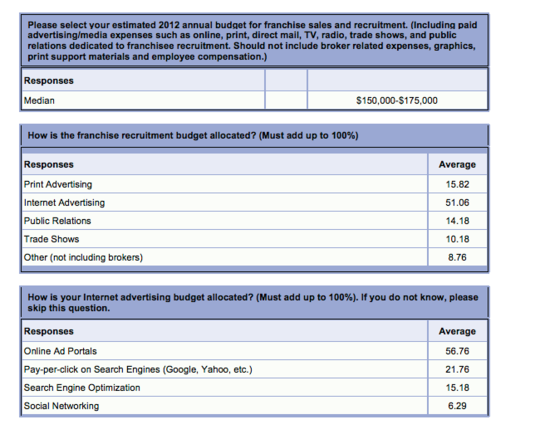
1. The Franchise Portal Spend
On average, then people are spending between around $42,000 and $51,000 on advertising for leads using Franchise Portals.
In essence, the format on the Franchise Portal is a display ad in a business directory with an application form to fill out for more details.
2. What are the Engagement Scores of the Franchise Portals?
It is very easy to get some objective comparsions between the various Franchise Portals.
I compared our site, franchise-info.ca to 4 webportals: franchise.com, franchisegator.com, franchisedirect.com & franchising.com, in 2012.
Click on the image below to expand it.

First, you want to focus the rank in US.
1. Franchisedirect
2. Franchisegator
3. Franchise-Info
4. Franchising.com
5. Franchise.com
Second, you want to pick some measure of engagment, say time on the site.
1. Franchise-Info
2. Franchisedirect
3. Franchisegator
4. Franchise.com
5. Franchising.com
Or you might pick pageviews, as another measure of engagement.
1. Franchise-Info
2. Franchisedirect
3. Franchise.com
4. Franchisegator
5. Franchising.com
3. Are there cheaper substitutes with similar engagement scores & that should produce the same number of leads for less?
Suppose your budget shows that you have been paying $800/month per display ad for portal 1 and $600/month for portal 2.
First, forget about the actual leads because we are interested in maximizing expected leads.
Second, is portal 2 more engaging than portal 1?
This calls for some judgment about how to balance relative rank against pageviews and time spent.
Make your decision, record the reasons why, and then revisit it in 6 months. Do the numbers still make sense? Is there evidence that you made the right trade-off? Should you rebalance again?
Keep at it and over time this rebalancing method will prove to produce better leads for less dollars.
If you want to use LinkedIn to recruit franchise operators, ask us to send you the
LinkedIn Sponsored Content Guide. We will sign you up for our LinkedIn Marketing Tips newsletter, too.
What type of theatre experience have you ever had?
Why do I ask you that question?
Because if you have ever been on stage in a play, part of a band, chorus, dance group, stage manager, grip, sound, prompter, make up, lighting, director, or any form of theatre where the audience and other co-workers are depending on you, then you probably already know the answer to why I ask.
And you probably have a great background for customer service!
I have a professional theatre background and it has helped my career thrive immensely in the customer service arena. Now, it doesn't mean if you don't have a theatre background you won't be good in customer service, it just means you'll understand the mentality of customer service faster, and perhaps better.
Theatre 101, as I call it, is a perfect precursor to being in customer service. It prepares you in the best way for all these topics and many more.
I fibbed, there are more than 11 skills.
That's a good thing though. Here they are.
* Interacting with others
* Being on time
* Knowing priorities
* Learning how to say something even when you forget your lines
* Knowing how to have a phony smile even when you don't want to
* Understanding your problems are just that: your problems
* Learning to work well with others, even if you don't like them
* Understanding how it all 'comes' together
* Helping others when they forget or don't know what to say
* Learning the "show must go on" mentality
* Learning how to read a script without sounding like it
* Knowing the applause is for everyone
* No complaining!
* Keeping your lines sounding fresh no matter how many times you've said them
* Getting it right "the first time"
* Practice, practice and more practice
* Learning to go with the flow
Here's a real life example of "The Show Must Go On" skill:
On the day of one of our Saturday performances (we did a matinee and evening show) I got a bee sting on my foot. It swelled up and I couldn't put my shoe on that foot.
I had a show to do at 2 PM. What to do? What to do? Sure, I could go barefoot, but that might ruin the show for the others. And certainly for the audience. Theatre minds do not want to do that.
So the theatre mind in me said, "Figure it out, Nancy. Do something. You need to be at the theatre in 1 hour and 45 minutes."
Theatre minds are not necessarily logical minds. However, we are spontaneous. We are quick thinkers. We know something has to be done and we figure out how. My husband has a bigger foot than I do so that was not going to look very good if I wore his shoes. (Didn't go with my outfit anyway.)
What to do? What to do?
I believe I did what most fellow actors would do. I thought of something. The stinger of the bee was removed. I took two aspirins and took my own shoes for the show with me to the theatre. I got to the theatre in time for the 30 minute call and told the stage manager (theatre translation: The Boss) what happened. "However," I said, "I'll be ok. It feels a little bit better and I can squeeze into the shoe."
So that's what I did. I squeezed into the shoe and the show went on. The performance was great. The audience never knew anything was wrong.
Was I in pain? Yes. However, I knew I had a job to do. I wasn't going to let the other actors down and I certainly wouldn't let the audience down. In essence they were all my customers. They were depending on me.
QUESTION: If you got a bee sting on your foot, would you go to work? Would you be able to talk with customers and not let that affect you? Would you complain about it, talk about it until others were sick of hearing about it?
The theatre mind is one that thinks of the audience before themselves. In reality it's the same with your customers. Think of them before you. Remember, customer service is the 'stage.' The customers are your 'audience.' Make yourself a STAR.
Thanks for reading....
Nancy Friedman , president of Telephone Doctor Customer Service Training, is a featured keynote speaker and subject matter expert on customer service and communications skills at franchise, association and corporate meetings. She has appeared on OPRAH, Today Show, CNN, FOX News, Good Morning America, CBS This Morning and hundreds of other radio and TV shows. She has been published in the Wall Street Journal with her column, "Don't Strike Out with Your Customers." Nancy is the author of eight books on sales, communications skills and customer service. She is the spokesperson in the popular Telephone Doctor customer service training programs.
For the 5 Most Fascinating Stories in Franchising, a weekly report, click here & sign up.
There are many, many words and phrases that can and will sabotage your business.
And, chances are, your staff is saying some of these now without your even knowing it - on the phone and in person.
And worse yet, you've probably even said some of these yourself (ouch)! That's the bad news.
The good news is we're able to bring to you the top five sabotaging phrases and then show you how to neutralize the effects. So get ready. You and your staff are about to be in a much better position to handle the Five Phrases to Sabotage Your Business today:
1. I Have No Idea
This is normally used as an excuse than anything else. It's a sure thing that the employee has not been shown how to explain something to the customer (i.e. no product training). This phrase is used as something to say when the employee doesn't know what to say.
When the customer hears "I have no idea" they immediately respond (usually silently) with, "You gotta be kidding me?" Interestingly enough, there normally is a certain blank stare accompanying this statement. Sad.
Instead, try "That's a great question, let me check and find out."
2. It's Not My Department
Well, then whose is it? Let's remember one of our Telephone Doctor mottos: Tell the customer what you CAN do, not what you CAN'T do. If you get a call and someone asks for something that you don't handle, it's far more effective to say, "Let me get you to someone in the area you need. I work in the paint department. You want electronics."
This is far more effective than telling someone it's not your department. And please don't say, "You have the wrong department."
3. I Wasn't Here That Day (or I was on vacation when that happened)
This one really makes me laugh. I don't remember asking them if they were there that day. Do you really think the customer cares if you weren't there when their problem happened? Honestly, they don't, so that's not even on the radar screen. Just tackle the problem head on. Apologize without telling them where you were...or weren't. Remember, you ARE the company whether you were at work or on vacation when the issue occurred.
4. I'm New
OHHHHHH! You're new? Now what? Does being 'new' allow you to be anything but super to the customer? When the customer hears this sabotaging statement, do you really think they say, "Oh, so you're new? That's why I'm getting bad service. Well, then that's okay...you're new. Now I understand."
Yes, even if you are new, the customer honestly believes you should know everything about your job.
Here's the answer on this one. Tell the customer, "Please bear with me, I've only been here a few weeks." That will buy you time and a bit of sympathy. For whatever reason, hearing the short length of time you are with the company means more to the customer than, "I'm new." Again, I'm new is more of an "excuse." Remember to state the length of time. It's a creditability enhancement. "I'm new" is a creditability buster.
5. Silence on the Phone or a Blank Stare in Person
I called the doctor's office the other day and asked to change my appointment. It went down like this:
"Hi, this is Nancy Friedman. I have a 9 a.m. appointment with Dr. Ring and I need to move it to later in the day."
Then NOTHING for about 10 - 15 seconds. Zip/nada/zilch.
So I said, "Hello? Are you there?"
A very irritated, annoyed voice came back with, "I'm checking."
Wouldn't it have been nice for her to tell me that? Ah, if the doctors only knew.
There are many more; these rose to the top!
Good luck!
# # #
To download our eBook, Hidden Gems, click here.
Nancy Friedman, president of Telephone Doctor Customer Service Training, is a keynote speaker at association conferences and franchise and corporate meetings. She is the author of eight bestselling books. Call Nancy at 314‑291‑1012 for more information or visit her online at www.nancyfriedman.com. Follow or connect on LinkedIn.
Her specialty? Customer service and engaging the customer.
Email her at [email protected]. She replies to all emails (and quickly).
It's plain old theatre folks. Some like it; some don't. While we cannot defuse false anger (Nancy circa 1990), there are those who like to role play and feel it's one of the more successful techniques in customer service training.
I'm not a big fan of role playing. (More coming on that with a Regis Philben story when I appeared on his show.) However, there are those who are and I do want to give you some ideas for those that do enjoy role playing in their training.
The process involves the trainer presenting the role play scenario and asking for volunteers to play the roles. (Volunteers meaning YOU.) The trainer provides the ground rules. Then selected trainees act out the scenario and the entire class analyzes the role playing.
Consider two approaches:
In the first, the players can attempt to think, speak, and behave like someone else. Being an irate customer is a natural role play for customer service training. This can teach the trainees to identify with other people and their problems, and to appreciate different perspectives. But again, it's very difficult to defuse false anger.
In the second approach, the players are themselves and report a particularly frustrating experience they have had as customers. This makes is more 'real.'
While role playing can be conducted in pairs or small subgroups, the procedures are quite effective when staged in front of the entire class. (Yes, scary if they're not use to, but get a life.) All trainees can normally, therefore, find ways to handle the roles. Alternative solutions can be tried which reflect company policies and various methods of dealing with customers.
To enhance role playing, use probing questions during the analysis of the scenario to guide trainees to arrive at workable solutions:
How well can you predict the reactions of the irate customers?
How else might the situation be managed?
What are effective approaches you have used?
In summary, what have we learned from this?
A ready list of subjects about customer problems from which the players can choose for role playing and discussion is helpful. Here are a few both in-person and on the phone.
- The store employee has just told you the item you want is out of stock. That's all they said. Play the scene out.
- In calling a company, you're trying to reach a human being and all you get is the automated attendant. Finally, someone answers. You want to know why you were not able to reach a human more quickly.
- You're trying to purchase an item and the person assisting you only gives one-word answers.
- You need someone to help you. After waiting in line for several minutes, you see that the clerk is fiddling with some paperwork, ignoring you. When asked if you could be helped, you're told to "hang on a sec. I'll be right with you."
If these role playing scenarios seem close to home, it's because most of us have experienced them. It brings everyday occurrences to the customer service training class. It's a way of making the training realistic.
Role playing demands some skill and practice on the part of the trainer. Deft handling of participants is needed. But you'll feel an enormous sense of accomplishment when you get an attendee, who may not have wanted to role play, up in front and being excited about pretending to be a customer!
There are those who might refuse or feel uncomfortable about role playing. If that's so, they may feel odd about handling a service 'experience' as well. Just saying.
# # #
Nancy Friedman , president of Telephone Doctor Customer Service Training, is a featured keynote speaker and subject matter expert on customer service and communications skills at franchise, association and corporate meetings. She has appeared on OPRAH, Today Show, CNN, FOX News, Good Morning America, CBS This Morning and hundreds of other radio and TV shows. She has been published in the Wall Street Journal with her column, "Don't Strike Out with Your Customers." Nancy is the author of eight books on sales, communications skills and customer service. She is the spokesperson in the popular Telephone Doctor customer service training programs.
A short, but ongoing course.
Are you really engaged?
Do you and your staff really know how to engage and interact with the customers? Do they even know what it means.
Seems as though every year there's a "new" word in Customer Service. And this year it's been "engagement."
Engage the customer.
What's it mean? Or better yet: What's does it not mean?
The answer to what it's NOT, is - - it's NOT the customer service experience. Don't confuse the two. They are quite different.
It is: Just as you might imagine....when you might have popped "the question," (or said "yes" if you were the one being asked), you normally went into what is called an 'engagement' period.
That's the time before the marriage. Time to better know and understand someone you're supposed to spend a lifetime with. Sometimes it's short and sometimes it's a longer period of time. But usually there's an 'engagement' period.
And so it is with our customers. Before they can "BUY," before they can become our customer (before we 'marry' them), we need to get 'engaged.' Make sense? Or starting to?
Right, you don't just walk up to someone and say, "Hello" and then head for the altar. It's the same idea in the sales and customer service world. There's an old sales saying: "The customer has to buy YOU first, before they buy the product." And it's true.
You need to spend a bit of time 'engaging the customer' before they buy or use your services. The Engagement is the time to wine and dine the customer; not physically - but mentally, and emotionally. Yes, to be on your best behavior. And you usually are. But as in marriage, it need not, and should not, must not, stop there.
I've never considered divorce (murder yes, not divorce.) However, those who have been through divorce coincidentally all shared a similar story to me. "They changed" I've been told. "They were so nice during the engagement period, but afterwards, it all changed."
I have always wondered why. Why be one way to get the customer and then another way after you get them? No wonder customers get upset. And when you think of it, in an engagement, you are each others 'customers.'
So to make it a bit easier for you to learn how to Engage a customer, below are a few (and only a few) ideas to 'get engaged' with your customer. There are many more. I will expound on them in another blog. And also I'll share more about the engagement. I wanted to keep this blog short, sweet and to the point.
To ENGAGE the customer one simply needs to follow these engagement guidelines:
* When a call comes in or a customer walks into your location, let them know they called or came into the right place! This is not brain surgery; just use those exact words.
* Names are critical, of course. To gain a customers name, you need to introduce yourself first; then ask theirs.
* Smiling is a condition of employment and grounds for termination. Can't make that strong enough! Not smiling is not an option.
* We need to remember, the customer is NOT always right; they always THINK they are right. Deal with the situation that way and it's much easier to handle.
* Don't argue with the customer. You'll lose every single time. You will never win.
* Watch out for Killer Words. These are words that will stop a conversation. Or even kill the conversation. A few killer words to beware of, from our surveys are: "No problem," "It's not our policy," "You don't seem to understand." We have plenty more of them to be sure. These happened to have gone right to the top.
* Be a double checker. No one likes to hear, "I don't know" or "We don't have that." Learn how to create the Telephone Doctor language of "positive statements at the top of the conversation." Once you do, the engagement period can start to move along.
* Please, thank you and you're welcome will never go out of style. EVER.
It's still not time to put the ring on the customers finger, but you'll be headed in the right direction with these steps or .... "Rules of Engagement".
I've been doing this a long time. It all works. More later.
# # #
Nancy Friedman , President of Telephone Doctor Customer Service Training, is a featured keynote speaker and subject matter expert on customer service, sales and communications skills, at franchise, association and corporate meetings.
As an "ENGAGEMENT SPECIALIST", she has appeared on OPRAH, Today Show, CNN, FOX News, Good Morning America, CBS This Morning and hundreds of other radio and TV shows.
She has been published in Wall Street Journal with her column, "Don't Strike Out with Your Customers.
Nancy is the author of eight books on sales, communications skills and customer service. She is the spokesperson in the popular Telephone Doctor customer service training programs. For a demo and full keynote speaking packet of Nancy call 314.291.1012 or visit www.nancyfriedman.com.
Or see how fast she answers emails: [email protected]
If you haven't heard about The Franchise Registry it's important that you do, especially if you're thinking about applying for an SBA-approved loan to acquire a franchise opportunity. Approximately 1,000 franchise brands (which is maybe a third of the franchise companies in North America) appear on the registry. For brands that do not appear, you probably will not get your SBA loan approved.
Even if you don't plan on securing an SBA loan to buy a franchise, The Franchise Registry is a good way to check out a franchise opportunity.
Checking Out The Franchisor's Operations
Prior to guaranteeing a loan for a franchisee, the SBA wants to be familiar with the franchisor's operating procedures. With nearly 3,000 franchisors operating in the USA, and changes occurring randomly to their operating procedures, it's a chore for the SBA to review all of those companies.
Some years ago, the SBA contracted with FRANdata, a company that provides objective information about franchising, to maintain the registry, conduct the ongoing reviews, and negotiate, as needed, with franchisors to help them comply with SBA's regulations. To be considered for the registry, franchisors pay $2,500. Some companies may balk at that, or simply not have the funds. However, it's a small price to pay to gain access to prospective buyers who need SBA funding.
Benefits Of The Franchise Registry
According to Darrell Johnson, president of FRANdata, the registry provides several benefits:
- It "comforts" lenders. The registry provides a risk-reducing factor to lenders and saves them time. If a franchisor appears on the list, the lender knows that the franchisor's documents have met the SBA's standards.
- It's a marketing tool for franchisors. The franchisors that appear on the registry can tell their prospective franchisees that their documents comply with SBA's lending criteria.
- It "comforts" prospective franchisees. When a franchisor appears on the list, it tells the prospective franchisee that the franchisor's franchise agreement isn't onerous. The SBA has reviewed the document and it's acceptable.
Is Your Franchisor Registered?
Take a moment to review the registry to find out which franchisors are listed. If you're considering a franchise that's not listed on the registry, and you know that you'll need an SBA loan to become a franchisee, your first step should be to tell the franchisor to get on the list. If you're not seeking an SBA loan, but your franchise opportunity of choice is not on the list, ask why!
My mother lived with me in her last years. We enjoyed her sense of humor.
Here's part of that - that made me realize how useless the phrase, "Hi How are you?" is.
The house phone rang. Esther answered.
The man says, "Hi, Mrs. Friedman, this is Dan from XXX, How are you?"
My mother says - without missing a beat:
"I'm so glad you called, I have a bad case of diarrhea, a terrible migraine, been vomiting all day, my pacemaker is running slower than normal, and I have a bad rash.... How are you?
He said, 'well, compared to you - a hell of a lot better" and hung up.
Point being; "Hi how are you" is semi useless" Especially to those we don't even know. I've seen folks pass in the halls, in a mall, in an office, everywhere... one says, "Hi how are you?" The other says "fine, how are you"?... no one stops...they're still walking - and nothing was accomplished.
I've removed "Hi How are you" from my vocabulary. It's been replaced with any one of these phrases and I share them with you:
- Good to see you.
- Hi, you're looking well.
- Thanks for being here
- You look super.
- Nice to hear your voice (On phone)
- I'm glad you called. (On phone)
- You're sounding great. (On phone)
There are more.. I just got the ball rolling......anything, but "Hi, how are you?"
I've changed my mind. It's not semi useless. Just useless.
Watch what happens when you change your tune. People start really listening to you.
For the 5 Most Fascinating Stories in Franchising, a weekly report, click here & sign up.
# # #
Nancy Friedman is a featured Keynote speaker and subject matter expert on Customer Service and Communications skills, at franchise, association & corporate meetings. She has appeared on OPRAH, Today Show, CNN, FOX News, Good Morning America, CBS This Morning & many others. Nancy is the author of 8 books on sales and customer service and is the spokesperson in the popular DVD customer service training programs. For a demo of Nancy call 314 291 1012 or visit - www.nancyfriedman.com.
Fred; I have been pitched over the past 25 years in franchising all manner of snake oil for "profiling" and many have said that they can measure top performers and we could use the model to recruit high caliber and similar franchisees and employees.
What do you say to a franchisor who wants a reliable predictive performance tool, other than buy yours?
How should they approach it practical manner? What should they expect from using such a tool?
 Joe - Let's start with the 5 basics of all good design.
Joe - Let's start with the 5 basics of all good design.
1. Predict Performance:
Make sure that whatever system you're considering was actually designed to predict performance for the job, in this case, owning a franchise.
2. Designed for Selection or Recruitment
Make sure the system under consideration was designed for selection. Several of the most common personality profiles specifically state on their websites that they were not designed for selection.
One even goes so far as to say it's unethical to use it for selection. Even so, people are out selling these profiles for selection purposes.
3. Don't Discriminate in an unreasonable manner.
Third, make sure that the system you're considering does not discriminate. Even unintentionally. See Griggs v. Duke Power Co. A good summary is at


